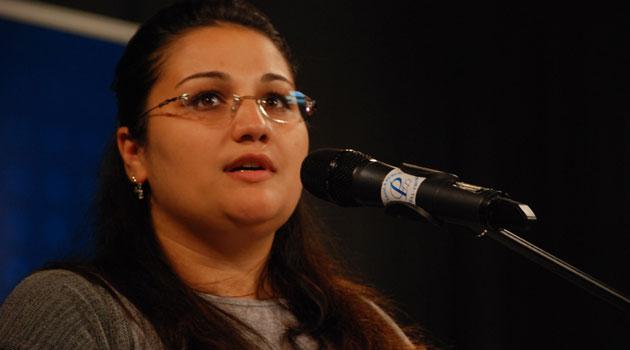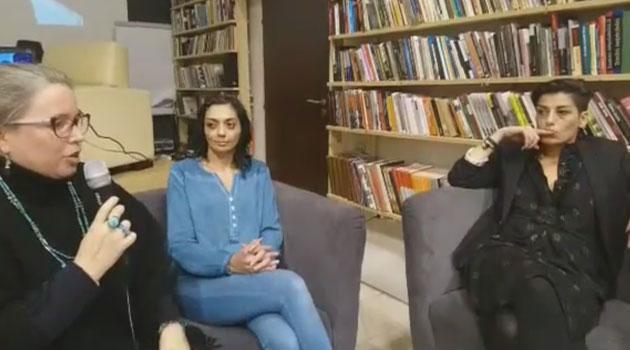Magdaléna Karvayová: We need to build up leaders from the Romani communities so their voices can be heard

Magdaléna Karvayová is a graduate of several prestigious schools who has worked for the Open Society Fund Prague and has long been involved in the situation of Romani parents in Ostrava. She has a great deal of energy and mainly a vision as to what it would be good to change in the Czech Republic.
News server Romea.cz has been regularly publishing interviews this year with people who are involved in interesting work that aids inter-ethnic coexistence in the Czech Republic. Interviewer Dana Moree is also asking her interviewees questions about terms that have contested meanings – words like “Czech”, “gadjo”, “Roma”, etc.
Q: What, in your view, is it necessary to do for us to live well here together? What are you doing?
A: There are many things we can do together. I will begin with my story. I was the only Romani girl in my primary school. From first to sixth grade I experienced rather harsh bullying, basically on the basis of the fact that I was darker-skinned than the other children. Each day I heard from them that I was a “dirty gypsy”, the older pupils even physically assaulted me, and I actually began to feel inferior, I didn’t want to go to school, I began to have health problems as well. It was horrible stress. Fortunately, I got good grades, but the atmosphere made it difficult for me to join the collective. The teachers would not acknowledge it, most of the time I was known as that Lenka or Magdička who just keeps complaining and whose father is constantly coming to the school to address something for her. Dad and Mom told me I should be proud of being Romani, that I should not be ashamed, and that I am first and foremost a human being, just like the rest of them. At that time, the feeling was born in me that once I would be an adult I would change the world. I would aid children who were undergoing the same thing I was, so I would study psychology, or I would change the laws so this would not happen anymore, and I would be a lawyer. Coincidentally, an acquaintance of mine saw what I was experiencing at school and mentioned the international college preparatory school in Hluboká nad Vltavou to me – back then, in 2001, students from more than 200 different states were studying three. There were children there from various countries – from Africa, Europe, even South America, basically from all over the world. There was enormous religious and other kinds of diversity there. All the instruction, naturally, was in English there, which was not my best language, but I really wanted to visit the school to see what it was like. Multicultural environments had always attracted me, I had the feeling that I would belong there, I would not have to defend myself each day. After an interview with the principal I was able to enrol into the eighth grade. He saw that my English was not good, but he also saw my strong motivation. Because I was the only Romani person there, it was also attractive for them to have Romani people represented. One memory really sticks in my mind: The school was across the street from its dormitory, and when I first arrived there, everybody – the pupils, the teachers and the tutors – came toward me, opened their arms, embraced me, and immediately said “Hi, hi!” The embrace was the first thing. That might not mean much to some people, but to me, at that time, it meant a rebirth, it was an enormous piece of good fortune, and I told myself: “This is exactly where I want to be.” It cost my parents CZK 20 000 [EUR 780] a month for six years. Their financial situation was not good, Mom was a cleaning lady, Dad was a former soldier, and I had two younger siblings. However, despite all that, my parents said: “If you want to study there, you will and we will do all we can for you.” Everybody, from the teachers to the tutors, gave me a great deal of support, and within three months I won the “Student of the Month” award, and great credit for that goes to my teachers, because they explained the material to me, they did their best so I always comprehended the main concepts, and I felt greatly supported by them.
Q: What happened next?
A: Then I was accepted to the Anglo-American University, where I graduated in Comparative Law, and I worked at the Open Society Fund Prague as coordinator of their program for human rights and education, where I had the opportunity to do both international and national-level advocacy in the area of fulfilling the judgment of “D.H. and Others vs. the Czech Republic”. I had the feeling there that I was doing something good, but I missed the element of community. I had the feeling that I alone will never change anything, that it is necessary to hear the voices of those who are affected, i.e., the Romani parents of these children. For that reason, together with colleagues from the Open Society Foundations network and with my colleague from Ostrava, Jolana Šmarhovyčová, we began a pilot program, and it involved conducting a campaign to enrol Romani children into good, mainstream, non-segregated schools. Beginning in October 2013 we met with Romani parents who had preschool-aged children and we gradually informed them about the school system, because they had almost no knowledge of it. For them, compulsory school attendance was a necessity for their children, but they did not know that we have basically two parallel education systems here. We began to explain to them how the school system works, what it means when their children are labeled as “mildly mentally disabled”, or when a child graduates from a “practical primary school”, what the difference is between a good mainstream school and a poor one. Another aspect of the work consisted of motivating them, because the community was inert, they were at a stage where they had no hope. Frequently they did not even know why their children had to be educated, they had the feeling that it was unacheivable that their child could ever become something more than a cook, a waiter, a hairdresser – or on welfare. We are continuing these campaigns for a fifth year and during the course of these four years we have managed to enrol 302 Romani children in Ostrava into good, mainstream, non-segregated schools. That is just one aspect of their empowerment. We are also building up leaders from the ranks of the Romani community in Ostrava. We are working, for now, just in four excluded localities, and during the last two years of this work we have put together a small group of the seven most active volunteers, who led the campaign themselves in 2015 and 2016 in their own localities, and during this year, 2017, the Romani community chose those volunteers as their representatives, as those who will represent their interests, and created the Romani Parents’ Association in Ostrava.
Q: I would like to ask you, just as I have all the other respondents, what your perception of terms like “Czech”, “non-Rom”, and “Rom” is – these words that we use so frequently?
A: I use those terms when people ask me where I am from. Because we Roma don’t have a state of our own, so I say that I am a Romani woman, and I live in Bohemia. It’s basically a question of identity. Naturally I am a Czech, I feel like a Czech, but I am also a Romani woman. That means I maintain my culture and traditions. There are moments when I also emphasize this – for example, I was on the tram, and I let an older woman have my seat, and I smiled at her, and she asked where I was from. I said I was Czech and she said “You aren’t a typical Czech”. I said “Well, yes, I’m a Romani woman living in Bohemia.” She said “You don’t look like a Romani woman” and we got to the fact that I am a college graduate, and through that kind of discussion I change the image of Romani people. Sometimes I use the word “Romani” intentionally. The media play a terribly big role here, most people from the majority society never come into actual contact with Romani people, and basically they have prejudices that are caused mainly by what they hear about Roma in the media. However, once they get to know Romani people personally, their perspective changes a bit.
Q: Does that mean you use the word “Rom” mainly when the subject comes up in the external environment?
A: When we say “Me som Rom” in Romanes, it means “I am a human being”. It’s connected mainly with identity, it’s about how one feels, internally. It is connected with identity and pride, because I am very proud to be a Romani woman.
Q: What exactly is it you are proud of?
A: The entire world belongs to Romani people, On the one hand we do regret not having our own state, but on the other hand I like the fact that we Roma live everywhere and that, for example, a Romani person living in Mexico can communicate in Romanes with a Romani person from Bohemia. Even if their dialects are different, they can comprehend each other. We have beautiful music and our history is also interesting – sad, but interesting. However, I am also a person who enjoys overcoming barriers and problem-solving, and because we Roma find ourselves in this situation and because we are overcoming it, I am proud of each success in that process.
Q: What are your dreams? If you had a magic wand, what would you conjure up?
A: I have a dream and I also have an ambition I am working on. If I had a magic wand to wave, I would really like to hold more events where the majority society and Romani people meet each other, because this is about something very simple, building relationships. I would also like the media to take an interest not just in negative matters, but also in positive ones. That’s my dream. The ambition that I have and that am working for is to have Awen Amenca become a nationwide organization that will build up leaders from the ranks of the Romani community, because they are the ones who must push for the change they need. This advocacy should not be done by us as an organization, it must be done by the people themselves. Our dream is to build up leaders from the ranks of the Romani communities, to empower them so that they finally find their voices and make their demands, so that they express what it is they expect from the state and from local administrations, but also so they know what their role is. This work is never about a single actor who wants to change something, it’s always about the involvement of more actors. For that reason we are doing our best to support Romani parents in the area of education, and we want our children to have better lives than we do.
